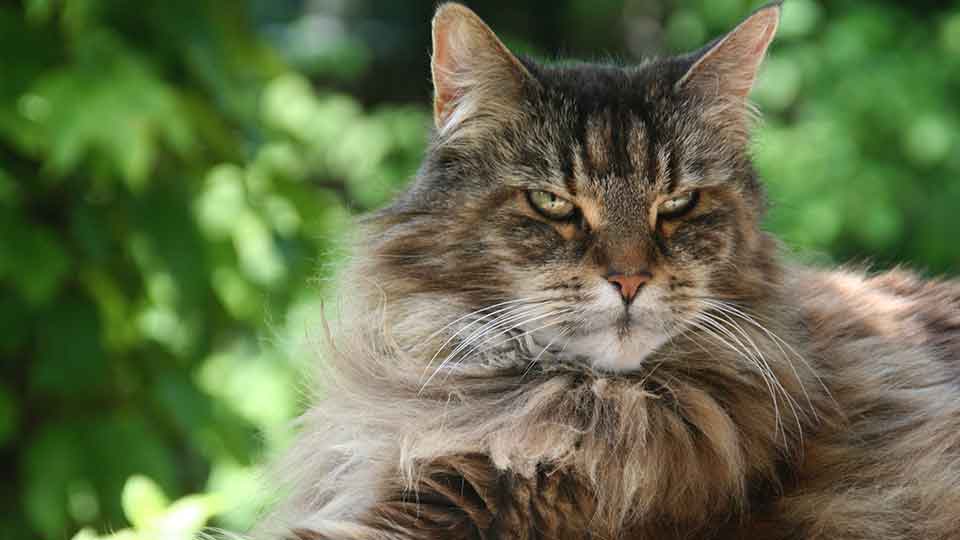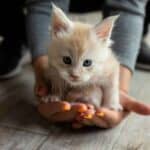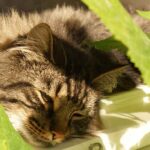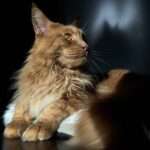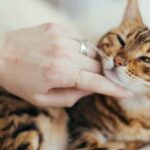Maine Coon cats are good hunters and mousers, exceptional ones.
They have a natural hunting instinct and a large size that makes them effective at catching and killing rodents. Some sources claim that Maine Coon cats are among the best breeds for this purpose.
If you are looking for a cat that can help you with your rodent problem, a Maine Coon cat might be a good choice.
They are also sociable and loving creatures that make great companions.
However, you should also consider the pros and cons of having a Maine Coon cat before you adopt one.
Large cats need a lot of space, grooming, and attention. They may also have some health issues that require regular vet visits.
Nevertheless, Maine Coon cat is a good solution for your mouse problem.
What Makes a Maine Coon Cat a Good Mouse Catcher?
There’s no denying the inherent hunting instincts in Maine Coons.
These cats, known as the “gentle giants” of the feline world, have a historical background that plays a significant role in their hunting abilities.
Originating from harsh outdoor environments, Maine Coons had to hunt to survive.
These instincts have been passed down through generations, and even today’s indoor Maine Coons retain these skills.
Size and Strength
One of the most obvious features of the Maine Coon cat is its size.
They are one of the most giant domestic cat breeds, weighing up to 25 pounds and measuring up to 40 inches in length.
This gives them much strength and agility to catch and kill rodents. They can easily overpower a mouse or a rat with powerful jaws and claws.
They can also run fast and jump high, which helps them chase their prey.
Coat and Fur
Another feature of the Maine Coon cat is its coat and fur.
They have a long, thick, and shaggy coat that protects them from cold weather and rough terrain.
They have a waterproof topcoat over a softer undercoat, and their fur is longer on the belly and legs to keep them warm.
This helps them hunt in different seasons and environments, such as snow, rain, or grass.
Their fur also helps them camouflage themselves and blend in with their surroundings, making it easier for them to sneak up on their prey.
Ears and Whiskers
A third feature of the Maine Coon cat is its ears and whiskers.
They have large tufted ears that help them hear better and locate their prey.
They also have long whiskers that help them sense their surroundings and navigate in the dark.
These features allow them to hunt when rodents are more active at night or in low-light conditions.
They can also detect their prey’s slightest movements and sounds, giving them an advantage over their competitors.
Tail and Paws
A fourth feature of the Maine Coon cat is its tail and paws.
They have a bushy tail that helps them balance and steer when they run and jump.
It also serves as a blanket to keep them warm when they curl up.
They have large and well-padded paws, with tufts of fur between the toes.
This helps them grip the ground and walk on snow.
They also have sharp claws that they can retract when they hunt.
These features enable them to hunt in different terrains and weather conditions, such as ice, mud, or rocks.
Intelligence
Maine Coons are highly intelligent felines.
This intelligence extends to their hunting, where they can strategize, stalk, and execute their pounce with precision.
Agility
Don’t let their size fool you.
Maine Coons are agile creatures. They can swiftly maneuver themselves, a trait that proves invaluable when pursuing a quick and erratic animal like a mouse.
Patience
One of the key traits of a good mouser is patience.
Maine Coons can wait for the perfect moment to strike, remaining still and focused for extended periods while on a hunt.
How Do Maine Coon Cats Hunt?
Watching cats on a hunt is nothing short of mesmerizing. The process is calculated, patient, and precise.
The Stalk
Maine Coons are masters of the art of stalking.
They can move incredibly slowly and silently, keeping their bodies low to the ground and their eyes locked on their prey.
They use their sharp senses to track the mouse’s movements, waiting for the perfect opportunity to strike.
The Pounce
When the moment is right, the Maine Coon springs into action.
The pounce is quick and precise, aimed at incapacitating the mouse swiftly.
It’s a testament to their agility and strength.
The Catch and Release
Interestingly, Maine Coons (and many other cats) often engage in a “catch and release” method.
After catching the mouse, they release it, only to catch it again when it tries to escape.
While this may seem like a cruel game, it’s actually a way for them to practice and refine their hunting skills.
The Kill
When the Maine Coon decides to end the hunt, they’ll typically deliver a killing bite, usually at the back of the mouse’s neck.
This method is efficient and typically results in a quick death for the mouse.
Therefore, Maine Coon cats are patient stalkers, precise attackers, and effective killers, making them excellent mousers.
However, it’s important to remember that not all Maine Coons will display a strong desire to hunt.
Personalities can vary widely within the breed, and some may prefer a good cuddle over a mouse chase.
But if you do have a mouse problem, and your Maine Coon shows an interest, they can certainly be a great asset.
Just remember always to ensure the safety and health of your pet first, as hunting can expose them to various risks, including disease and injury.
Are Male or Female Cats Better Mousers?
In my experience, the mousing abilities of a cat aren’t inherently tied to their sex.
Whether a cat is a good mouser depends more on their personality, instincts, and experiences than whether they’re male or female.
In the wild, male and female cats hunt for food and feed their young.
So, both sexes have an instinctual drive to stalk, pounce, and catch prey.
Many factors can influence a cat’s inclination and ability to hunt, such as their early experiences, level of interest in play (which mirrors hunting behaviors), and overall confidence and curiosity.
Sometimes, spaying or neutering can decrease a cat’s hunting instincts, as these procedures reduce the production of certain hormones.
However, this isn’t always the case, and many sterilized cats continue to be prolific hunters.
When seeking a good mouser, looking at the breed and the individual cat’s behavior is more beneficial.
Some breeds, like the Maine Coon, have a strong hunting lineage, but even within breeds, there’s considerable variation in hunting interest and skill.
How to Train a Maine Coon to Be A Good Mouser?
Training a Maine Coon to be a good mouser isn’t about teaching them to hunt – that instinct is already in their DNA.
Instead, it’s about providing opportunities for them to practice and refine their hunting skills in a safe and controlled environment.
Play with Your Cat
Interactive playtime is the perfect opportunity to stimulate your Maine Coon’s hunting instincts.
Use toys that mimic the movement of mice, such as feather wands, laser pointers, or motorized mouse toys.
Let your cat catch the “prey” occasionally to keep them interested and satisfied.
Encourage Exploration
Hunting involves a lot of exploration and stalking.
Encourage this behavior by providing your Maine Coon with plenty of places to explore and hide, such as cat trees, tunnels, and boxes.
Start Early
The best time to stimulate a cat’s hunting instincts is when they’re a kitten.
If you have a young Maine Coon, introduce them to prey-like toys early and engage in regular play sessions.
Reward Successful Hunts
When your cat successfully “catches” their toy during playtime, reward them with a treat or a petting session.
This helps reinforce their hunting behavior。
Be Patient
Remember that not all cats are avid hunters, and that’s okay.
Training should be fun and stress-free for both you and your cat.
If your Maine Coon isn’t interested in mousing, they may prefer other forms of play or interaction.
Remember, even with training, your cat should not be relied upon as the only pest control method.
It’s always essential to maintain a clean and secure home to prevent infestations in the first place.
Consider consulting a professional pest control service if you have a persistent mouse problem.
What Do Maine Coon Cats Eat In The Wild?
In the wild, their diet primarily consisted of what they could hunt and catch.
Small Mammals
The staple of a wild Maine Coon’s diet would likely be small mammals, such as mice and other rodents.
These creatures are common in most environments and would provide a readily available food source.
Birds
Maine Coons are agile climbers and would often hunt birds.
They would use their stealth and patience to stalk and pounce on unsuspecting birds.
Fish
Since Maine Coons are known for their unusual love of water, they might also catch and eat fish.
Their water-resistant fur and dexterous paws make them adept at fishing.
Insects and Other Small Creatures
Insects, spiders, lizards, and other small creatures would also be part of a wild Maine Coon’s diet.
Every opportunity would be well-spent when it comes to securing food.
It’s important to note that while Maine Coons in the wild have a diverse diet, domestic Maine Coons should be provided with a balanced and nutritionally complete diet of commercial cat food.
This food is specially formulated to meet all their dietary needs.
Feeding them a diet based solely on what they would eat in the wild could lead to nutritional deficiencies or excesses.
Do Neutered Cats Still Hunt?
Yes, neutered cats do still hunt.
The act of neutering (removing a male cat’s testes) or spaying (removing a female cat’s ovaries and uterus) does decrease certain hormone levels in the body, which can lead to changes in behavior.
However, these procedures don’t eliminate the instinctual drive to hunt.
Hunting behavior in cats is not solely driven by hunger.
It’s also a form of play and exercise, and it satisfies their instinctual need to stalk and catch prey.
This is why well-fed domestic cats still often engage in hunting behavior, and neutered and spayed cats do as well.
However, it’s worth noting that while neutered cats can and do still hunt, their overall activity levels may decrease after neutering, potentially leading to a decrease in hunting behavior.
Additionally, individual cats will vary greatly in their desire to hunt, regardless of whether they’re neutered.
It’s crucial to provide all cats, neutered or not, with plenty of stimulation and exercise to keep them healthy and satisfied.
Interactive toys that mimic prey, like feather wands or mouse toys, can help satisfy their hunting instincts in a safe and controlled way.
This is especially important for indoor cats, which have different opportunities to engage with the outside world than outdoor cats.
Plenty of opportunities to “hunt” can help keep them mentally and physically stimulated.
Do Maine Coons Hunt Birds?
Yes, Maine Coons, like most cats, have the instinctual ability and drive to hunt birds.
They are adept climbers and can be quite stealthy, which aids them in stalking and catching birds both in trees and on the ground.
Their patience, agility, and precise pouncing skills make them good hunters, capable of catching swift and elusive prey like birds.
However, it’s important to note that not all Maine Coons will actively hunt birds, as there is a significant variation in hunting behavior among individual cats.
Additionally, if a Maine Coon is kept as an indoor pet, their opportunities to hunt birds will be limited.
Do Maine Coon Cats Kill Snakes?
Maine Coons, with their hunting instincts and formidable size, are capable of killing snakes, especially smaller ones.
They are curious creatures and might be drawn to the movement of a snake.
Depending on the situation, a Maine Coon might engage in predatory behavior towards a snake, similar to how they would behave with other potential prey.
However, it’s important to recognize the potential danger in these interactions.
While a Maine Coon might be able to kill a small, non-venomous snake, larger or venomous snakes pose a significant risk to the cat.
It’s crucial to prevent your Maine Coon (or any pet) from interacting with potentially dangerous wildlife.
Will A Maine Coon Kill Chickens?
While Maine Coons are skilled hunters, they are not likely to pose a significant threat to adult chickens due to the chicken’s size and defensive capabilities.
However, smaller, vulnerable chickens such as chicks could be at risk.
That being said, much depends on the individual cat’s temperament and behavior.
Some Maine Coons might be uninterested in chickens entirely, while others may see them as potential prey.
If you keep both Maine Coons and chickens, it’s essential to supervise their interactions and provide secure housing for your chickens to prevent potential conflicts.
FAQ
Which cat is the best mouser?
There’s a good deal of variation in hunting prowess among individual cats, but certain breeds are known for their mousing skills.
These include:
- American Shorthair: This breed was originally brought to North America by settlers due to their excellent mousing abilities. They’re still known for this skill today.
- Maine Coon: These large cats were originally barn cats and have a strong hunting instinct. They can be excellent mousers.
- Siamese: Despite their elegant appearance, Siamese cats can be great hunters. They’re intelligent and agile, making them good at catching mice.
- Norwegian Forest Cat: Like the Maine Coon, these cats have a history of being barn cats and have retained their hunting skills.
Remember, individual personality and experiences can heavily influence a cat’s interest and skill in hunting.
Therefore, it’s not guaranteed that a cat from these breeds will be a great mouser.
Do Maine Coons have any predators?
In their natural habitat, adult Maine Coons don’t have many predators due to their size.
However, kittens or smaller Maine Coons could potentially fall prey to larger predators such as coyotes, large owls, or eagles.
In urban areas, the biggest threats to Maine Coons are cars and dogs.
Regardless of their size or breed, cats are safest when kept indoors or provided with a secure outdoor environment.
Why do cats bring you dead animals?
Cats bring their owners dead animals for several reasons:
- Gift-Giving: Cats are solitary hunters in the wild, and mothers teach their kittens to hunt by bringing home dead or injured prey. Domestic cats often treat their human caregivers like family and may bring them “gifts” of dead animals.
- Teaching: Your cat may think you’re not a very good hunter (which is probably true in the sense they mean it) and is trying to teach you how to hunt.
- Instinct: Even if a cat doesn’t need to hunt for food, the instinct to hunt, catch, and share prey is hard-wired into their behavior.
It’s important to remember that outdoor cats hunting can negatively impact local wildlife populations, particularly birds.
If your cat is a keen hunter, consider keeping them indoors and providing lots of interactive play to satisfy their hunting instincts.

